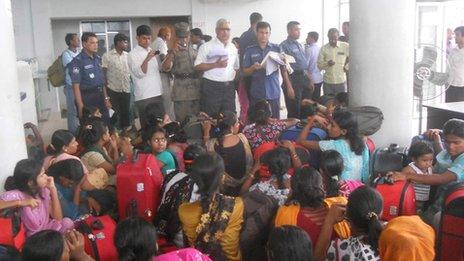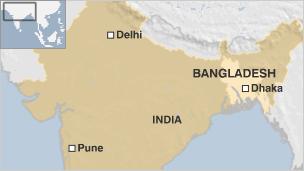Bangladesh trafficked women recount ordeal in India
- Published

The women all had harrowing stories of their trafficking ordeal
A group of Bangladeshi women who were illegally taken into India three years ago have been describing their ordeal at the hands of human traffickers.
Most of these women were forced into prostitution in the Indian cities of Mumbai and Pune.
Around 48 women and a child were rescued by an Indian non-governmental organisation which handed them over to Bangladeshi authorities at the weekend.
It was one of the largest groups of Bangladeshi women ever to be returned.
The women said they were tricked into being taken across the border.
"A girl in the village gave us something to eat and said we could go for a picnic to neighbouring India. Later on we realised we were drugged. We crossed the border by walking through paddy fields in the night," Monica, 22, told the BBC.
"When we came to our senses, we realised that we had been sold to an Indian agent."
After spending a few days in Calcutta, Monica and other girls were taken to Pune.
"We were kept in small rooms. There were hundreds of girls in the shanty town. We were forced into the sex trade," Monica, from a remote village in southern Bangladesh, said.
"I was shocked but we had no choice as were constantly threatened by local agents."
'Uncertain future'
While there are no official figures on such trafficking, activists say thousands of young Bangladeshi girls and boys are smuggled to India and the Gulf countries every year.

They say that the traffickers cunningly exploit Bangladesh's border with India, which is more than 4,000km (2,400 miles) long.
Some were lured with promises of lucrative jobs but later ended up in brothels in Indian cities.
"We were compelled to work from eight in the morning until midnight. There were hundreds of girls like me in the brothel in Pune," said Runa, another woman who had been rescued from India.
"The ordeal continued for weeks and there was no chance to escape from the place. I am happy to be back in my own country."
But many problems may still lie ahead.
"Although these women have been brought home, an uncertain future awaits them. Due to the social stigma many of them may not be able to return to a normal life," Bangladesh National Women's Lawyers' Association Salma Ali told the BBC.
She pointed out that the latest incident had once again highlighted how young women continue to be trafficked despite Delhi and Dhaka enacting various laws to curb the problem.
"We want the authorities from both sides to tighten the international border and increase security so that girls like me won't face this fate," Runa said.
- Published30 August 2011